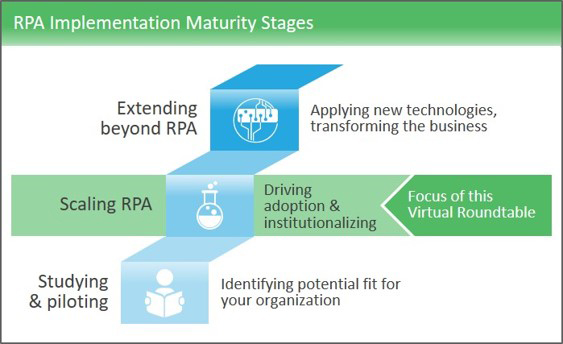
Don’t Be an RPA Loser – Making the Most of Your RPA Deployments
Virtual Roundtable
Thursday, December 14 | 11 a.m. - 12:30 p.m. EST
Your roundtable hosts
-

Sarah Burnett
RPA Research Lead
-

Eric Simonson
Facilitator
Note that participation is limited to enterprises only (no service providers), and Everest Group must approve each attendance request
About the Virtual Roundtable

Robotic Process Automation (RPA) offers great potential for efficiency and yet many organizations fail to move beyond a simple Proof of Concept (POC). Everest Group research shows that many POCs do not represent the full complexities of deploying RPA in real operational environments, leading to difficulties in scaling up. And yet, it is only by scaling up RPA that organizations can maximize its benefits. How do organizations address this problem and get the most value from their RPA investment?
Following introductions, we will offer a very brief, context-setting best practice session on how we have seen organizations accelerate RPA benefits. The bulk of the time will be dedicated to group discussion, with participants sharing how they are approaching their automation programs, including the role of POCs, deployment approaches, and other relevant topics as they arise.
-

Who should attend
Enterprise global services and outsourcing executives who want to share and discuss practical hints and tips to move beyond the POC stage to make the most of their RPA deployments.

-

What you will learn
Learn about the typical challenges peer organizations have faced in deploying RPA and how they have overcome them and share thoughts on best practices for deploying RPA. -

Virtual Roundtable Guidelines
Participation is limited to senior executives within enterprises (no service providers), and each attendance request must be approved by Everest Group to ensure an appropriate size and mix of participants. The sessions are 90 minutes in duration and include introductions, a short presentation, and 60 minutes of facilitated discussion.
